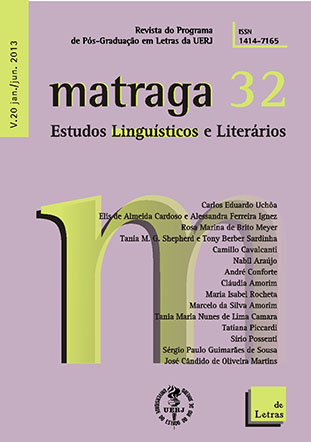HYPOCORISTICS, NICKNAMES AND SOCIAL CRITICISM: LANGUAGE AND STYLE IN MACHADO DE ASSIS
Keywords:
Machado de Assis, style, hypocoristic, nicknameAbstract
The anthroponym is the trace of individuation in a particular social group. In turn, when there is greater intimacy between members of this group, it is common for interaction to occur through the use of hypocoristics and nicknames. It is worth mentioning such terms are not synonymous: the first provides basic language training, while the second relies on psychological motivation. The literary domain is a privileged field of study of the relationships established in structuring the narrative, between nominated and the nominator, both in relation to the choice of anthroponyms or that of hypocoristics and nicknames. The purpose of this article is therefore to present the last two ways of naming characters as a feature of the social-critical style of Machado de Assis. The corpus consists of three of his novels: Memórias Póstumas de Brás Cubas, Quincas Borba e Dom Casmurro. The choice of morphological features, as well as the construction of noun phrases resulting from specific combinations, prove to be relevant in meaning production in the text. In addition to a way of reading, this is another feature that characterizes the at times mocking or affectionate spirit of Machado’s pen.
Downloads
Downloads
Published
How to Cite
Issue
Section
License
Authorization
Matraga – Scientific Journal of the Post-graduate Program in Arts and Humanities of UERJ is authorized to publish the article submitted here, if it is accepted for online publication. It is attested that the contribution is original, that it is not being submitted to another publisher for publication, and that this statement is the expression of truth.
The works published in Matraga's virtual space – Scientific Journal of the Post-graduate Program in Arts and Humanities of UERJ will be automatically transferred, and your copyright is reserved to Matraga. Its reproduction, in whole or in part, is conditional on the citation of the authors and the data of the publication.

Matraga uses license Creative Commons - Attribution-Non-Commercial 4.0 International.





